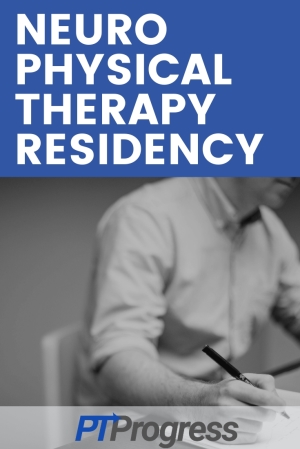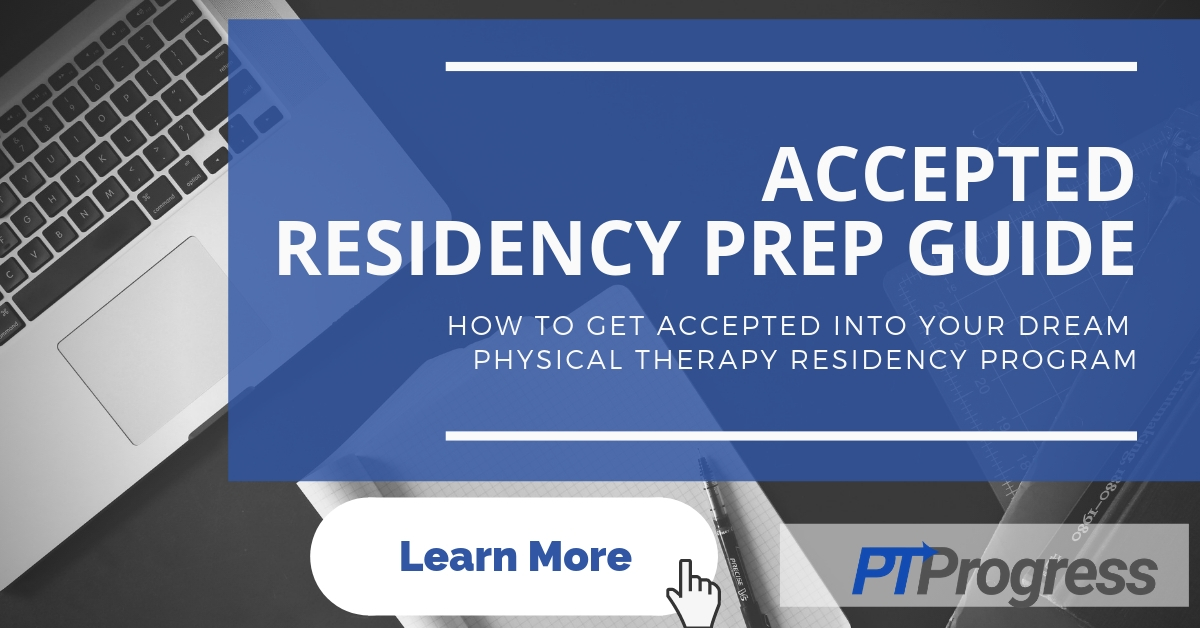This article was written by Cam Jadali, a board-certified neurologic clinical specialist who completed a Physical Therapy neuro residency. If you’re interested in learning more about the Physical Therapy residency application process, check out the ACCEPTED: Physical Therapy Residency Guide.
With hyper-specialization on the rise in our profession and the advent of high selective residency training programs, many DPT students and young PTs may be asking themselves “Should I pursue a neurologic residency training program?”
The answer is highly dependent on your individual goals, learning style, personality, geographic mobility, and a variety of other personal factors. The following step by step approach asks a yes or no question at each step.

5 Questions to Answer Before Considering a Neurological Physical Therapy Residency
If you answer yes, please continue to the next question. If you answer no, it does not mean that you cannot apply to or complete a residency training program. Simply that you should pause and consider if a residency program is right for you. Here we go!
1. Do I want to complete this program to advance my career and clinical practice skills?
The motivation behind why you want to complete a residency program is paramount for both the application process and during residency. A residency program is not just some weekend course to put on your resume. It is an extremely grueling year-long training program designed to make you one of the best therapists in your field. You should want to complete a residency program to:
- Advance your career 10 years ahead of your peers
- Be a leader in your specialty area
- Gain exposure to research, teaching, and interprofessional collaboration
- Receive structured mentoring in a variety of practice settings
- Gain knowledge and experience that best prepares you to sit for a pass a specialty exam
2. Am I a good multi-tasker/effective under high levels of stress?
You will be doing a million things at once for the majority of the residency year. This may include managing a full clinical caseload, preparing for mentoring sessions, completing didactic course work, teaching, lab assisting, researching, and reviewing current literature all in one week or even one day.
There will be a lot asked of you with seemingly not enough time to do it all. It is important that you come into a residency program with the necessary time management skills and relaxation skills to survive this kind of workload. If you want more insight into the complete load please see our blog on a day in the life of a physical therapy resident.
3. Do I respond well to constructive criticism?
Mentoring is the cornerstone of any residency program. The feedback is high volume, consistent, blunt, and intended to make you the best young clinician in your field. There are times where this constant constructive criticism can be a bit overwhelming. I know there were weeks where I thought I couldn’t do anything right. It is best that you are totally open to criticism, and do not have a know it all mentality.
Your mentors have been doing this dance longer before you did (in my case before I was even born), and dropping your pride at the door is essential to soak up all the knowledge and skills your mentors have to offer. If you have very thin skin or are sensitive to tough feedback, a residency may not be the right fit for you?
4. Am I financially stable/able to get through the next year?
Surprise! We as PTs are not compensated enough for what we do, but that is a story for a different blog post! Double surprise! PT residents usually make even less than typical practicing PTs. What does that mean? It means that you may have to live on a more restricted budget that you normally would post-graduation.
The nice thing is you will likely be able to defer your massive loan payments for the year that you are in residency with appropriate supporting documentation from your program. If you are planning any big purchases, large vacations, or investments, residency may not be the best time to do so. I have known some residents who take out additional loans, have support from family, or have a side source of income to support themselves during this time.
5. Am I able to relocate and move myself (and family if you have a partner and/or children)?
This one may seem obvious, but it will be unlikely that your dream residency or residency you are accepted to is close to your desired geographic location. You will likely have to relocate to and be very close to where you are working as you spend much of your time on site. Moving away from friends, support networks, and moving your family must be considered in the equation. You are given time off during residency to travel and see your family/friends but it is few and far between.
If you’re still serious about pursuing a Physical Therapy residency after reading this article, I’d highly encourage you to take a look at the ACCEPTED Physical Therapy Residency Prep Guide. It gives you a behind the scenes look at how I applied to and was accepted into one of the top Neuro PT residencies in the country. It also shares my full application and residency essays to give you a leg up as you apply to physical therapy residencies this year. Good luck and go get em!



